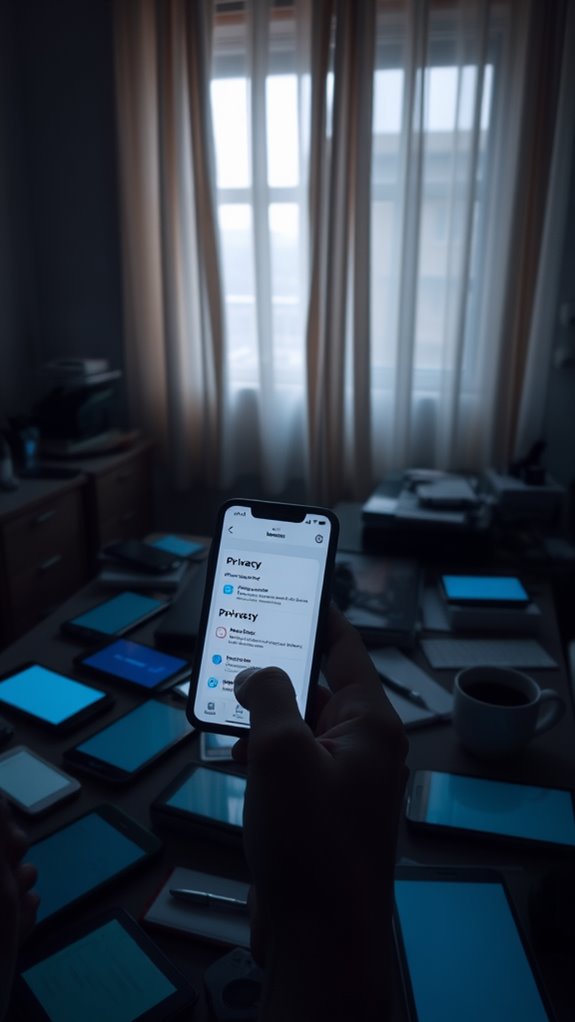To ride privately without being tracked, consider conventional bus services and rail networks with limited tracking to minimize digital footprints. Walking or cycling enhances anonymity through counter-surveillance techniques, while carpooling without digital coordination fosters trust and privacy. Non-digitally tracked taxi services, alongside private chauffeurs, offer discretion. Furthermore, opting for vehicles that do not rely on GPS helps manage tracking preferences. Engaging in anti-surveillance fashion further blends you into your environment, providing thoughtful options for discreet travel as you'll discover further.
Quick Takeaways
- Utilize non-digitally tracked taxi services by hailing cabs directly on the street to avoid digital footprints.
- Engage in carpooling without digital tracking through informal coordination, relying on direct communication and trust.
- Opt for walking or cycling, taking side streets to minimize visibility to surveillance systems and enhance anonymity.
- Wear anti-surveillance fashion that features adversarial patterns to confuse facial recognition technologies while traveling.
- Use non-GPS devices to maintain control over your tracking preferences and protect your identity while on the move.
Conventional Bus Services

Conventional bus services, while integral to public transportation networks, often grapple with significant privacy concerns that can affect your riding experience. The lack of bus service anonymity in these systems can lead to unintentional tracking, as data collection practices frequently expose your usage patterns. Moreover, vulnerabilities in tracking systems can result in unauthorized access to sensitive location data, raising security risks that jeopardize your privacy. In this context, many cities are exploring modern surveillance tools that can enhance safety but may also compromise individual privacy. This increase in surveillance practices can inadvertently threaten civil liberties, underscoring the need for vigilant privacy protection. To counteract these issues, implementing robust privacy protection measures, such as data anonymization and limited data collection, is essential. Additionally, adopting controlled access measures can further enhance user privacy by restricting information visibility to only what is necessary.
Walking or Cycling

While many may overlook the benefits of walking or cycling as viable transportation options, these modes present distinct advantages that enhance both personal privacy and overall well-being. By employing urban privacy strategies such as taking side streets or choosing less crowded times, you can effectively reduce your visibility to surveillance systems, thereby allowing for a more discreet journey. Furthermore, maintaining physical distancing from known surveillance points can significantly improve your chances of evading facial recognition technologies. Engaging in counter-surveillance techniques can further enhance your ability to navigate the urban landscape with anonymity.
Moreover, walking and cycling embody sustainable transport methods that contribute positively to the environment, emitting no greenhouse gases. They also offer remarkable health benefits, improving cardiovascular fitness and muscle strength, while providing flexibility in route planning. As you navigate urban settings, consider utilizing paper maps or compass navigation to maintain control over your journey, a principle that aligns with our mission at Surveillance Fashion.
Carpooling Without Digital Tracking
Carpooling presents a practical alternative to solo driving, particularly when you prioritize privacy and flexibility in your commuting experience. By utilizing informal coordination methods, you can establish effective carpool agreements without digital tracking, which often compromises your privacy. Engaging in direct communication allows you to negotiate logistics more fluidly and foster trust. This approach empowers you to manage schedules without the constraints of digital platforms, thereby providing you with greater control over your commuting experience. Additionally, employing grassroots tactics can further enhance your ability to resist surveillance while commuting. Community-led initiatives can also play a vital role in supporting facial recognition countermeasures that protect your anonymity during shared travel.
| Advantages | Considerations |
|---|---|
| No digital trail | Requires face-to-face meetings |
| Enhanced schedule flexibility | May limit the pool of potential carpoolers |
| Reduced risk of data breaches | Trust-building among participants |
Non-Digitally Tracked Taxi Services

Maneuvering through urban environments without the omnipresence of digital tracking can enhance your sense of privacy and autonomy, particularly when considering non-digitally tracked taxi services.
You might choose among various options, such as:
- Street-hailed taxis: These traditional vehicles can be flagged down directly, eliminating any digital footprint.
- Private hire: While requiring pre-booking, this option allows you to choose your driver and avoids app-based tracking systems.
- Taxibuses: Operating on fixed routes, these offer a communal yet less monitored travel alternative.
Rail Networks With Limited Tracking

As rail networks evolve, the implementation of limited tracking systems can provide a delicate balance between operational efficiency and passenger privacy.
By utilizing limited tracking technologies, privacy-focused rail networks can enhance safety without compromising your anonymity. For instance, certain systems employ RFID tags for freight rather than passenger tracking, thereby reducing data collection on individual movements. Additionally, the rise of privacy accessories has led to innovative ways individuals can protect their personal data while traveling.
Moreover, anonymization techniques protect identities while maintaining real-time monitoring capabilities, ensuring operational efficiency. Additionally, the integration of data-resistant fashion can empower travelers to shield their personal information while on the move.
Regular security audits and tighter controls on data sharing with third parties further reinforce this commitment to privacy.
As we explore these innovations, we at Surveillance Fashion endeavor to highlight the importance of maintaining control over personal information in an increasingly interconnected world, ensuring you can travel with confidence and discretion.
Use of Private Chauffeur Services

When considering transportation options that prioritize privacy and security, the use of private chauffeur services emerges as a compelling choice.
These services offer a range of features designed to enhance your experience while ensuring confidentiality.
Private chauffeur services provide features that elevate your travel experience while prioritizing your privacy and confidentiality.
- Chauffeur Safety: Vetted chauffeurs undergo thorough background checks, ensuring you're in capable hands.
- Vehicle Discretion: Opt for high-end vehicles that maintain a low profile, allowing you to travel without drawing attention.
- Client Profile Management: Choose services that respect your privacy, safeguarding personal data and travel details.
Opting for Non-GPS Tracking Vehicles

Opting for non-GPS tracking vehicles can greatly enhance your privacy, especially in an era where digital footprints are increasingly scrutinized. By utilizing alternative tracking methods, such as SIM-based tracking or cellular network triangulation, you can mitigate the risks associated with GPS surveillance.
These techniques, while generally less precise, offer a cost-effective solution for vehicle privacy without the complexities of traditional GPS systems.
For instance, RFID tracking can identify your vehicle through tagged readers, providing a discreet alternative. Additionally, the integration of non-GPS devices with smartphone applications allows you to maintain control over your tracking preferences, ensuring that you dictate the limitations of your privacy.
As we explore these options, it becomes clear that safeguarding your vehicle's identity is a proactive approach to personal security.
What is Anti-surveillance Fashion?

What is Anti-surveillance Fashion?
Anti-surveillance fashion represents a proactive response to the pervasive threat of biometric surveillance, which has surged amid growing public awareness and concern regarding privacy violations. This innovative approach utilizes various strategies to safeguard biometric privacy, including:
- Adversarial Patterns: Clothing designed with complex designs that confuse facial recognition algorithms, making identification difficult. Such designs often employ optical illusions to further disrupt the effectiveness of surveillance technologies.
- Technological Enhancements: Items like the Camera-Shy Hoodie that use infrared LEDs to blind cameras, providing a personal shield against surveillance.
- DIY Solutions: Open-source toolkits for crafting anti-surveillance fashion at home, promoting community collaboration while emphasizing individual control.
As the market for surveillance technology grows, embracing fashion innovation in this domain not only empowers you but also contributes to a larger movement advocating for privacy rights. Additionally, the rise of anti-facial recognition clothing has sparked interest among fashion designers to create pieces that blend style with functional protection.
Discreet Travel Attire Options

While traveling, the choice of discreet attire can greatly enhance your overall experience by allowing you to navigate various environments with both comfort and confidence.
Opt for discreet fabrics, such as moisture-wicking blends and breathable cotton, which resist wrinkles and adapt to diverse climates. Innovative designs in outerwear can also incorporate data-resistant features to further protect your privacy.
Versatile styles, like multi-purpose dresses or layered outfits, enable you to blend seamlessly into local cultures while minimizing luggage.
Incorporating neutral colors and simple accessories further reduces your visibility, allowing you to maintain an understated elegance.
Functional elements, such as hidden pockets for valuables and elastic waistbands for comfort, enhance practicality. Additionally, consider clothing that features surveillance-blocking technology, which can help protect your digital identity while you're on the go.
Questions and Answers
How Can I Identify Non-Digitally Tracked Taxi Services?
Picture slipping unnoticed through a crowded street. To find non-digitally tracked taxi services, explore local taxi options, ask for anonymous ride services, and rely on community recommendations. Your control over privacy starts here.
What Are the Legal Implications of Using False License Plates?
Using false license plates exposes you to severe legal consequences, including felony charges and hefty fines. Ethically, it undermines public safety and trust, putting you in a precarious position with law enforcement and the community.
Are There Privacy Risks With Renting Gps-Free Vehicles?
Renting GPS-free vehicles can still pose privacy risks. You should consider GPS limitations and potential data exposure through infotainment systems. Always be proactive in managing your vehicle privacy by avoiding syncing devices and checking for stored data.
Can Public Transit Systems Guarantee Anonymity for Passengers?
You might think public transit guarantees anonymity, but it often doesn't. Your passenger privacy rights can be compromised through data collection. Advocating for stronger policies can help secure your freedom while using public transit systems.
What Alternatives Exist for Ride-Sharing Without Smartphone Tracking?
You can explore alternatives like traditional taxis, where cash payments keep you off the grid. Carpooling with friends or using community transport services also offers control without the constant tracking of ride-sharing apps.
References
- https://www.budgetautotransporter.com/disable-gps-while-shipping-a-car
- https://portal.cops.usdoj.gov/resourcecenter/content.ashx/cops-w0047-pub.pdf
- https://fretron.com/tracking-mechanism-for-transportation-tracking/
- https://www.mdpi.com/2624-800X/3/3/25
- https://www.brickhousesecurity.com/gps-trackers/gps-tracking-laws
- https://www.buswhere.com/security-and-privacy/
- https://www.178wing.ang.af.mil/Portals/69/documents/afh33-337.pdf?ver=2016-12-15-101008-313
- https://www.the74million.org/article/relied-on-by-parents-hailed-by-schools-gps-bus-trackers-raise-security-risks/
- http://miamibeachseniorhigh.net/wp-content/uploads/2023/06/Practical-Research-Planning-and-Design-Capstone-Research.pdf
- https://transitcenter.org/publication/do-not-track-a-guide-to-data-privacy-for-new-transit-fare-media/












